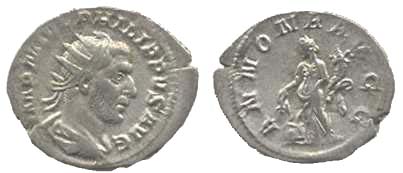| 244 AD - 249 AD |
Imperium Romanum
| Antoninianus AR 22 |
SHH 691 |
 |
| Parameter Obverse Reverse Notes Reference Accession |
2.69 g 20.5-24.1 mm 12:00 o'clock VF Draped and cuirassed bust of Philippus right, wearing radiate crown; IMP M IVL PHILIPPUS AVG clockwise around; border of dots. Annona standing left, holding corn-ears over prow in right hand, and cornucopia in left hand; ANNONA AVG around; all within border of dots. Mint of Rome. Roman Imperial Coinage (RIC) IV Rome 29 19.11.2001 J. Howe |
Philip I the Arab 244 - 249 AD Philip
I's opportunity to become emperor came upon the death of Timesitheus,
Gordian III's trusted (and trustworthy) advisor. Timesitheus had been
the commander of the Praetorian Guard, and the mastermind behind
Gordian's campaign against the Persian king Shapur I, which had started
off quite well. Unfortunately for Rome and Gordian, but fortunately for
Philip, Timesitheus got sick and died, and Philip was appointed to take
his place. Philip
pursued the Persian campaign with considerably less vigor than
Timesitheus had, and he also may have begun siphoning off supplies
intended for the soldiers. Philip blamed the lack of military success
and supply shortages on Gordian, and the soldiers believed him. When
Gordian heard that the troops were unhappy with him, he confronted the
soldiers and insisted that they choose between him and Philip. They
voted in the usual Roman military style, and Gordian's remains were
shipped back to Rome. Philip's
next act was one that would have serious repercussions for Rome for
quite some time: He bought peace with Shapur I. He was in a hurry to
get back to Rome to secure his position as the new Emperor, so he paid
Shapur a half-million denarii and promised him ongoing payments as
well.
Philip didn't do much of note. He did repel some border incursions by the Carpi across the Danube, and he celebrated a "triumph" for this, but the main thing he is remembered for is the magnificent party he threw for Rome's 1,000th birthday, a three day affair starting on 21 April, 248. However, a series of uprisings by would-be usurpers supported by various disaffected legions plagued the final year and a half of his reign. His confidence apparently broken, he is said to have offered to resign, but was talked out of it by the respected senator Quintus Decius Valerinus. With the Goths taking advantage of the disarray in the unhappy Danubian legions, Philip did something rather foolish -- at least in hindsight. Since Decius had been the one who talked Philip out of resigning, he apparently believed it was safe to put Decius in charge of all the legions in the area. He was wrong. After successfully repelling the invasion under his leadership, Decius's troops "coaxed" him to declare himself Emperor in opposition to Philip. They marched on Rome, confronting Philip's larger army. Philip was killed in the fighting, possibly by his own soldiers. |